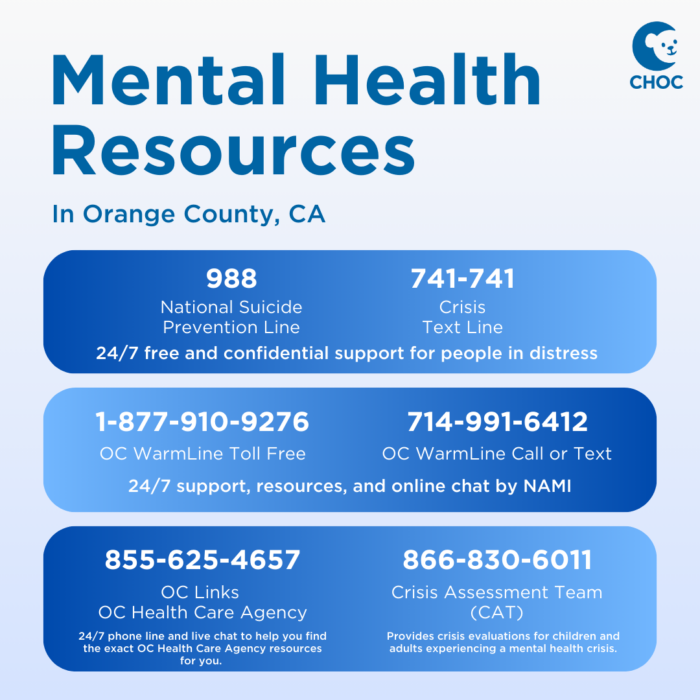By Dr. Shirin Mostofi, pediatric psychologist at CHOC
It can be difficult to have a conversation about mental health with our loved ones. When trying to talk about mental health with our children, we may find that we stumble onto challenges such as how to start the conversation, what to talk about and what to do with the information we receive.
In addition, it may be hard to talk about our loved one’s mental health with them because we may fear failing them by not providing the support they need. Our own worries may become too overwhelming to engage in such discussions with them.
The topic of mental health has, historically, been a subject that is seen, by many, in a negative light. Considering how people with mental health conditions are often negatively depicted in movies, and how the media and society uses offensive language to refer to people with a mental health condition, it is not surprising that talking about such a stigmatized subject can appear daunting.
While it may seem as though there are limited opportunities to discuss mental health in our day-to-day lives, the Center for Disease Control and Prevention (CDC) reports, “mental illnesses are among the most common health conditions in the United States.” According to the CDC, more than half of people will be diagnosed with a mental health condition at some point in their lives.
Additionally, 1 in 5 children have had, or will have, an impairing mental health condition. The CDC reports that the most diagnosed mental health conditions in children three to 17 years of age (between 2016 and 2019) include:
- Attention Deficit/Hyperactivity Disorder (9.8%, about 6 million individuals).
- Anxiety (9.4%, about 5.8 million individuals).
- Behavioral problems (8.9%, about 5.5 million individuals).
- Depression (4.4.%, about 2.7 million individuals).
Lastly, 1 in 6 children between two and eight years of age present with a diagnosed mental, behavioral or developmental condition. Given the prevalence of mental health conditions in our communities, and among children, there seems to be an urgent need for us to feel more comfortable and confident when talking about mental health.
This article will provide some general guidelines for how to make it easier to talk about mental health with our children.
Making a connection with your child
Having a relationship or a connection with a child can make it easier for the child to talk about more challenging topics, including mental health. A connection is often established and boosted when we create positive shared experiences with someone. With a child, creating a connection could look like sharing casual, relaxed, non-pressured time together and taking on more of a “buddy” role with the child. This can provide a safe space for the child to have some difficult conversations with caregivers.
Creating a connection with children will also help the child shift the way they think about their caregivers’ involvement in their lives. The child may go from thinking, “my caregiver is prying into my personal life by asking questions about how I am” to, “I want to share some of my challenges with my caregiver.”
An example of how you can build a connection with your child is to spend about 15 minutes a day enjoying each other’s company. If you notice that your life has taken you away from finding time or motivation to have fun with your child, this practice may start a bit more structured. So, you may want to set aside a specific amount of time each day to bond. If this bonding time is a new part of your routine, at first this practice may be uncomfortable for you both as you and your child are re-learning how to relax and “be” with one another. You may also find yourself in a one-way conversation with your child.
It may take your child some time to learn and trust that your dedicated time together is genuinely for fun. With persistence and practice, this dedicated time may become a more natural part of your daily routine, and you may find that being in each other’s presence changes from “uncomfortable” to “enjoyable.”

Mental Health Education Program (MHEP) webinars
Activity ideas that you can take part in during your bonding time include:
- Walking while having conversations around the environment, weather and your day)
- Having a dance party or listening to music while talking about favorite artists, types of music and memories associated with the songs
- Play games with conversations around competitiveness and choosing games
- Cook or bake together while talking about around finding a recipe, whom to share the food with and favorite foods.
Managing your own reactions
As your children begin to share more information about their struggles, it is important that you remain aware of your own reactions to the information they are sharing.
Children are more likely to share personal information with those who show that challenging conversations are not “scary.” You can provide a child with a safe space to talk about difficult things by showing a calm demeanor, continuing to talk at a casual pace, spacing out the number of questions you ask and avoiding getting other caregivers involved.
If you find that having tough conversations is hard for you, consider taking a moment (or ten) to pause on the conversation or step away to take a few breaths, take a walk or do something that relaxes you before you continue the conversation.
Being genuine in responses, questions and sharing
Something that can help a child feel more comfortable when having a tough conversation, like when they are talking about their mental health, is having a loved one show genuine interest and give genuine responses to the information the child is providing. A child may appreciate when a caregiver shares their own reactions or challenges in the moment.
Consider saying something like, “I appreciate knowing and hearing this from you. I need a moment to pause and take a few breaths so that I can continue this conversation in a calm and supportive way for you.”
Similarly, when asking questions about their well-being, children may respond more positively to questions that center around how a caregiver can provide support. For example, “I think I’m seeing a different look or expression on your face that wasn’t as obvious to me before; am I picking up on something?”
One way you can show children that you have a genuine interest in their mental well-being, is by starting a daily check-in. When a caregiver initiates a check-in, it sends the message that their loved ones are paying attention to them. If taking part in a daily check-in is a new habit for your child, consider showing them how you talk about your day to normalize that everyone faces challenging situations and that it is okay to talk about difficult experiences in life.
An example of a personal check-in could be, “I had a hard time listening to my co-worker giving me feedback about my work today; what was one thing that was hard for you today?”
In addition to modeling a check-in for your child, also be sure to notice and ask about any changes you see in them. For example, you could say, “You seem more quiet than usual, maybe something is worrying you, I’m here for you if you’d like to share.”
This could help make it easier for your child to take part in a check-in with you.
How to continue the support
As your child becomes more comfortable with talking about their mental health with you, it is also important to be cautious with the type of responses you provide in return. When your child shares about difficult situations or topics, you may be tempted to take care of your children by trying to make the cause(s) of their issues go away, present a brighter future and/or reassure them of their strengths and values.
However, children may shut down if your initial response is to offer solutions; to criticize their thoughts, feelings, or actions; or devalue their experiences because they may just want to feel heard and validated. So, when talking with your child, consider giving as much time needed to share things with you, before jumping in to provide a solution or to fix the problem at hand. This practice, known as holding space or “validation,” will help your child feel supported and will allow feeling comfortable with sharing more with you.
Remember that children will more commonly want “buddy type” responses before wanting a solution or guidance on how to feel better. So, for instance, if your child shares hatred towards they look, you can try saying something like, “It can be hard to feel motivated to get ready in the day if you’re feeling disappointed in your appearance” instead of brushing off their feelings or trying to offer a solution. Here is an additional example:
Your child says: ”I am not smart enough for anything and I am a failure.”
You may say something like this first: “You may be feeling the pressure of failing at school right now, and your efforts are not shown the way you hope that they do. It’s a heavy weight to carry. You’re not feeling confident in yourself as much right now.”
If you were going to say something like this, say it later (not first): “If you would like my support in any way, I am here for you. We can figure out how to manage the pressure of school; perhaps by getting extra tutoring support. We can talk about that when you’re ready.”
In summary, creating a connection and becoming comfortable having difficult conversations with your child can help your child feel more supported by you. However, if you feel that your child needs additional support, below are some resources that can help you and your child talk about, and manage, your child’s mental health.
Mental health resources for children
Finding a Mental Health Provider
CHOC Mental Health Education Program

Mental Health Resources
for Orange County, CA
Download and print this card with a list of phone numbers to keep on hand in case of a mental health emergency.
Other Resources
If your child expresses thoughts of wanting to harm themselves or others:
- Call 911 or visit the nearest Emergency Department
- Suicide & Crisis Lifeline (previously National Suicide Prevention Lifeline) | Call, text, or chat 988
- Crisis Text Line | Text “HOME” to 741-741
- The Trevor Project Crisis Lines | Text “START” to 678-678 or Call 1-866-488-7386
Get more expert health advice delivered to your inbox monthly by subscribing to the KidsHealth newsletter here.
Get mental health resources from CHOC pediatric experts
The mental health team at CHOC curated the following resources on mental health topics common to kids and teens, such as depression, anxiety, suicide prevention and more.





